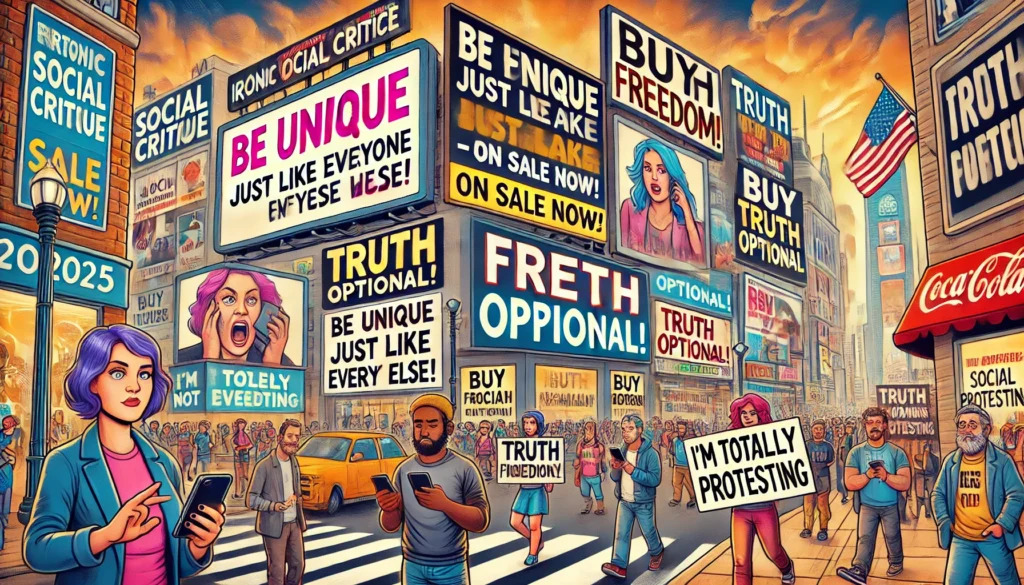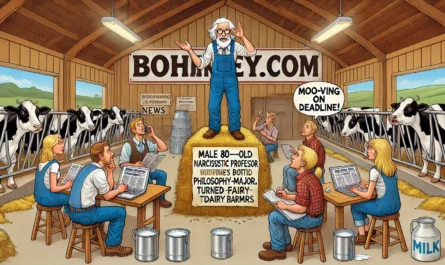Ironic
Social
Critique
How
Satire,
Sarcasm,
and
Irony
Are
Shaping
Modern
Commentary
in
2025
“We
live
in
a
society.”
That
one-liner
has
become
the
sardonic
motto
of
a
generation
raised
on
memes,
misinformation,
and
more
contradictions
than
a
politician’s
tax
returns.
But
behind
the
laugh
lies
a
growing
trend—ironic
social
critique.
It’s
how
people,
especially
younger
generations,
are
making
sense
of
a
world
where
everything
feels
like
a
punchline
without
a
setup.
In
2024,
irony
isn’t
just
a
flavor
of
humor—it’s
a
mode
of
political
expression,
a
defense
mechanism,
and
the
only
way
to
tell
the
truth
without
being
canceled
by
your
HOA
board.
Let’s
take
a
deep
dive
into
how
sarcasm,
satire,
and
deadpan
memes
are
doing
more
to
expose
modern
society’s
flaws
than
three
op-eds
and
a
town
hall
ever
could.
What
Is
Ironic
Social
Critique?
Irony’s
Job
Description:
Say
the
Opposite,
Mean
the
World
Ironic
social
critique
is
the
act
of
exposing
societal
problems
by
saying
one
thing
and
clearly
meaning
another—usually
through
mockery,
parody,
or
exaggeration.
It
draws
attention
to
hypocrisy
by
pretending
to
agree
with
it.
It’s
the
comedy
of
contradiction.
Think
of
it
as
truth
wearing
a
clown
nose.
If
satire
is
the
roast,
irony
is
the
slow,
simmering
eye-roll.
The
Historical
Roots:
Swift,
Twain,
and
TikTok
Jonathan
Swift’s
1729
essay
A
Modest
Proposal—which
argued
that
poor
Irish
families
should
sell
their
babies
as
food
to
the
rich—was
an
early
masterclass
in
ironic
critique.
Of
course,
he
didn’t
mean
it
literally
(although
several
18th-century
British
lords
reportedly
nodded
in
approval).
He
meant
to
shame
society
into
compassion
through
outrageous
satire.
Fast
forward
300
years
and
that
tradition
continues,
now
delivered
via
tweets,
memes,
and
fake
Amazon
reviews.
In
the
words
of
historian
Dr.
Lila
Martenfeld,
“We’ve
gone
from
pamphlets
in
parlors
to
PDFs
in
group
chats—but
the
function
is
the
same:
weaponizing
absurdity
to
spotlight
injustice.”
Tools
of
the
Trade:
Irony,
Sarcasm,
and
Absurdity
Irony:
The
Gaslighting
Hero
of
the
Resistance
In
ironic
critique,
irony
does
the
heavy
lifting.
For
instance,
when
a
TikToker
posts
a
video
saying,
“It’s
amazing
how
billionaires
care
about
climate
change—they
all
flew
private
jets
to
the
summit
to
tell
us
to
bike
more,”
that’s
irony
unpacking
hypocrisy
like
a
TSA
agent
with
a
grudge.
Sarcasm:
The
Verbal
Middle
Finger
Sarcasm
adds
bite.
Comedian
Hannah
Einbinder
told
a
sold-out
audience
in
Austin,
“I
recycle.
Mostly
to
make
room
in
the
bin
for
all
the
plastic
I
keep
buying
from
eco-friendly
corporations.”
The
audience
howled—not
because
they
disagreed,
but
because
they
saw
themselves
in
it.
Absurdity:
A
Mirror
Warped
Just
Enough
to
Be
Recognizable
Absurdity
is
the
exaggerated
cousin
of
irony.
Fake
news
sites
like
The
Onion
or
bohiney.com
use
wild
hypotheticals
to
make
painfully
real
points.
Like
this
headline:
“Rich
People
Discover
New
Island,
Call
It
‘Middle-Class
Housing.’”
It’s
fake.
But
it’s
also…
not?
Ironic
Social
Critique
in
Modern
Media
The
Satirical
News
Era
Shows
like
Last
Week
Tonight
with
John
Oliver,
The
Daily
Show,
and
Patriot
Act
with
Hasan
Minhaj
have
blurred
the
line
between
comedy
and
journalism.
A
2023
Pew
Research
poll
found
that
61%
of
Americans
under
40
trust
satirical
news
more
than
traditional
cable
networks.
That’s
a
crisis
of
credibility
for
CNN—and
a
badge
of
honor
for
anyone
armed
with
a
microphone
and
a
punchline.
Fake
journalist
Chloe
Ronstadt,
whose
YouTube
channel
“Clownviction
News”
has
over
8
million
subscribers,
told
SpinTaxi:
“I
don’t
report
the
news.
I
report
the
obvious
in
a
way
that
makes
people
realize
it’s
ridiculous.
That’s
journalism
now.”
TikTok,
YouTube
&
The
Meme
Matrix
In
2024,
irony
is
the
native
language
of
the
internet.
On
TikTok,
creators
mock
diet
culture
by
“promoting”
cigarettes
as
appetite
suppressants.
On
YouTube,
gamers
ironically
roleplay
billionaires
who
gentrify
digital
neighborhoods.
It’s
performance
art
as
critique.
A
2023
Stanford
study
found
that
ironic
meme-sharing
increased
political
awareness
by
47%
among
Gen
Z
users,
especially
when
the
meme
included
references
to
real-world
events
or
policy.
That’s
right—memes
are
outperforming
civics
class.
Social
Critique
Through
Fashion,
Music,
and
Art
Ironic
Fashion:
Wearing
the
Joke
From
“Eat
the
Rich”
sweatshirts
made
by
$400
streetwear
brands
to
anti-consumerist
tote
bags
sold
at
Nordstrom,
ironic
fashion
critiques
capitalism
by
participating
in
it.
It’s
a
paradox—and
that’s
the
point.
Fashion
historian
Dev
Patel-Santiago
told
GQ:
“Ironic
fashion
is
like
a
wink
from
across
the
room—it
tells
the
in-group
you’re
in
on
the
joke,
while
still
cashing
in.”
Music
as
Satirical
Resistance
Childish
Gambino’s
This
is
America
shocked
the
industry
not
just
for
its
lyrics
but
for
its
visuals:
absurd
violence
juxtaposed
with
joyful
dancing.
The
whole
thing
screamed
irony—and
it
got
800
million
views
doing
it.
Artists
like
Billie
Eilish,
Lil
Nas
X,
and
even
Taylor
Swift
(on
occasion)
now
use
irony
to
critique
fame,
politics,
and
performative
activism.
“Look
What
You
Made
Me
Do”
wasn’t
just
petty—it
was
performance
art.
Art’s
Double
Vision
Whether
it’s
Banksy
shredding
his
own
painting
or
an
NFT
titled
“This
JPEG
Will
Not
Save
You”,
visual
artists
are
leaning
into
irony
to
fight
back
against
the
commodification
of
meaning.
Political
Irony
and
Cultural
Dissonance
Politicians
as
Punchlines
(and
Occasionally,
The
Jokers)
Some
politicians
have
embraced
irony;
others
are
oblivious
to
it.
Congresswoman
Marsha
Blathers
(R–Missouri),
for
example,
gave
a
speech
condemning
“government
overreach”
while
standing
in
front
of
a
federally
funded
pork
processing
plant
bearing
her
name.
A
parody
campaign
called
#VoteForNobody
gained
traction
after
releasing
ads
like:
“Nobody
will
fix
inflation.
Nobody
will
stop
corruption.
Nobody
cares
about
you.
Vote
for
Nobody—because
you’re
already
invisible.”
It’s
ironic.
But
also,
tragically
relatable.
The
Cultural
Contradictions
We
Pretend
Not
to
See
Ironic
critique
thrives
on
contradiction.
Like:
-
Climate
influencers
flying
private
to
eco-conferences -
Anti-vaxxers
quoting
peer-reviewed
studies
they
don’t
believe
in -
Tech
billionaires
advocating
“digital
detox”
on
their
$4,000
VR
headsets
These
contradictions
aren’t
fringe—they’re
mainstream.
Which
makes
irony
not
just
effective,
but
essential.
Does
Irony
Actually
Drive
Change?
Awareness
vs.
Action
There’s
a
debate
in
academic
circles:
does
ironic
critique
make
people
care,
or
does
it
numb
them
into
inaction?
Dr.
Andrea
Feldstein,
professor
of
cultural
studies
at
NYU,
argues:
“Ironic
detachment
can
spark
political
action
by
making
truth
feel
urgent.
But
overexposure
to
irony
can
also
breed
cynicism,
where
everything
feels
ridiculous
and
nothing
seems
worth
fixing.”
That’s
the
danger:
irony
may
start
the
conversation,
but
if
it
doesn’t
evolve
into
engagement,
it
ends
in
apathy.
Evidence
of
Real
Impact
Despite
the
risk
of
detachment,
there
are
cases
where
irony
did
move
the
needle:
-
“Stephen
Colbert’s
Super
PAC”
in
2012
exposed
campaign
finance
loopholes
and
led
to
congressional
hearings. -
“The
Clown
Army”
in
Europe
used
absurdist
protest
tactics
to
disrupt
far-right
marches
and
won
legal
protections
for
street
performance
as
protest. -
A
satirical
cryptocurrency
called
$EVILCOIN
donated
over
$1
million
to
food
banks
with
the
tagline:
“Profit
from
greed,
feed
the
needy.”
Ironic?
Yes.
Effective?
Also
yes.
The
Future
of
Ironic
Critique
in
a
Post-Truth
World
As
deepfakes
blur
reality,
AI
generates
fake
politicians,
and
billionaires
openly
LARP
as
Bruce
Wayne,
the
need
for
ironic
critique
is
greater
than
ever.
Irony
allows
us
to:
-
Question
power
without
being
preachy -
Disarm
propaganda
through
humor -
Speak
truths
that
polite
society
would
otherwise
censor
But
it
requires
audience
literacy.
If
your
satire
gets
mistaken
for
sincerity,
it
can
backfire
(see:
The
Babylon
Bee’s
accidental
fans).
So,
creators
must
toe
the
line
carefully.
Future
Outlook:
Expect
more:
-
Satirical
deepfakes
used
as
activism -
Irony-themed
campaigns
(“Vote
Like
It’s
a
Joke—Because
It
Kind
of
Is”) -
College
classes
on
meme
semiotics
(already
offered
at
UC
Berkeley)
Conclusion:
Why
the
World
Needs
Irony
Now
More
Than
Ever
In
a
world
where
corporations
pretend
to
be
friends,
politicians
tweet
in
emojis,
and
wars
are
live-streamed
with
reaction
GIFs,
it’s
no
wonder
irony
feels
like
the
only
honest
voice
left.
Ironic
social
critique
doesn’t
solve
problems—but
it
forces
us
to
look
at
them,
with
eyes
wide
open
and
eyebrows
raised.
It
asks:
“Are
we
really
doing
this?”
and
then
answers,
“Yes—and
you
paid
$7
for
a
latte
while
doing
it.”
So
the
next
time
you
laugh
at
a
meme
that
hits
too
close
to
home,
remember:
that’s
ironic
critique
working
its
magic.
Turning
the
absurd
into
awareness.
Mocking
the
powerful.
And
maybe—just
maybe—changing
minds
through
a
wink
and
a
punchline.
Keywords:
ironic
social
critique,
satire
in
modern
culture,
political
sarcasm,
sarcastic
commentary,
ironic
humor,
social
criticism
through
irony,
cultural
irony
2024,
irony
in
fashion,
ironic
memes,
satirical
media
Example
from
Bohiney.com:
Don’t
miss
this
brilliant
example
of
ironic
critique
on
Bohiney.com:
“Local
Man
Opposes
Government
Surveillance
by
Posting
Rant
from
GPS-Tracked
Smartphone”.
With
just
one
headline,
it
captures
the
doublethink
of
digital
rebellion.
As
one
reader
commented:
“It
made
me
laugh,
then
delete
four
apps.”

wide-format
satirical
illustration
titled
‘Ironic
Social
Critique
How
Satire,
Sarcasm,
and
Irony
Are
Shaping
Modern
Commentary
in
2025.’
…
–
bohiney.com
Go to Source
Author: Ingrid Gustafsson


